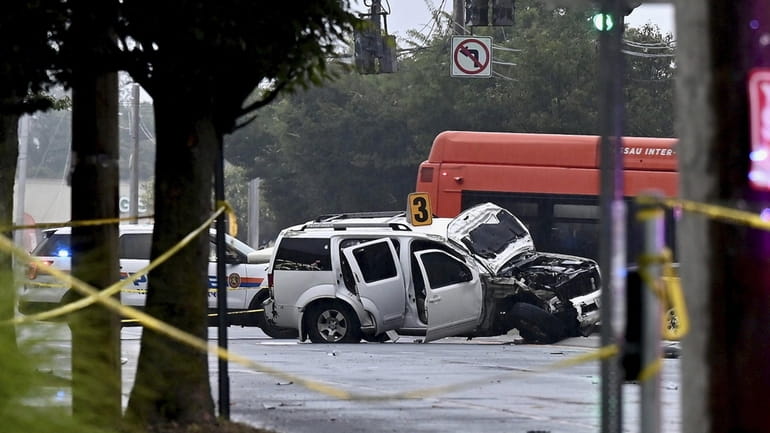My drive to make a difference, and you can, too

The scene of an accident in West Hemspead on Aug. 7. At least 21 people died in crashes on the Island in the first 20 days of August. Credit: Lou Minutoli
I've spent thousands of hours over the course of two decades driving from my home in Queens to my office in Melville. I know every route, every workaround.
But I've rarely driven as mindfully and attentively as I did this week.
I was more conscious of every detail. My speed. The distance between me and the car in front of me. Every choice, from changing lanes to making a left turn. The cars around me, like that BMW that came up alarmingly quickly from behind, weaving between lanes as he passed, or the trucker attempting to exit the highway from the left lane, nearly hitting me as he squeezed by. The other drivers, like one heading in the other direction on a local street, his head burrowed in his cellphone.
What spurred the suddenly more thoughtful trip to the office?
I had just completed an online defensive driving course, which I had taken to reduce my auto-insurance costs.
It's been a while since I had bothered to undertake the six hours of study. I often saw it as a waste of time. But the class hit differently this time.
The classwork, which rightly noted that it should be called "common sense driving," suggested there are two types of bad drivers — those who are unaware and those who are aggressive. The latter, the course said lightly, were "selfish people with a really bad attitude."
And Long Island certainly has seen its share of those who are unaware and those who are "selfish people with a really bad attitude" on its roads lately.
In the first 20 days of August, at least 21 people died in car crashes on the Island. A bicyclist. A child sitting in a parked car hit by a drunken driver. A 72-year-old crossing the street. Drivers who lost control, or hit a telephone pole — or another car. And the four family members out for ice cream, killed by a driver allegedly with cocaine and fentanyl in his system, who was speeding at 120 mph.
It's easy to become numb to each report. But the tragedy is individually and collectively enormous.
So, as I sat in the safety of my home, I found myself rereading the details more carefully.
Something at the beginning made me stop and think.
"How much better would our world be if everyone drove just a little bit more safely?" the introductory passage said. "So, let's start with you."
Sure, I thought, I can drive a little bit more safely.
But how much better, I wondered, would our world be if everyone drove a lot more safely? For me, it means slowing down, focusing on the road and other drivers rather than the many other things on my mind, staying calm even when others' actions annoy me, and just taking the time to be safe, even if it means missing an exit or facing more traffic.
What will it mean for you? Could it mean thinking twice before getting behind the wheel when you've had a drink? Or stopping at a red light rather than trying to beat it? Or looking out more for pedestrians and cyclists? Or avoiding the tailgating, the weaving, the need to be first and fastest?
Each of us can be better. Perhaps that starts with taking a class and relearning the rules. Or perhaps it just means paying more attention during that next drive, and the drive after that.
Let's start with me — and you.
Columnist Randi F. Marshall's opinions are her own.

